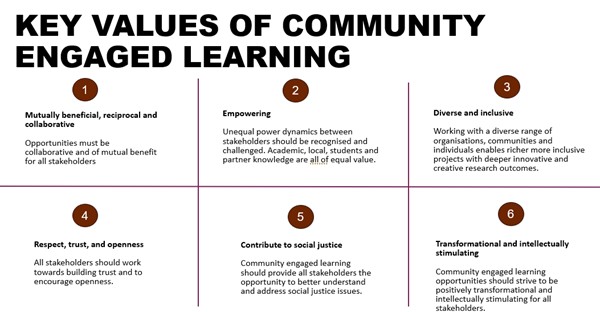Community engaged learning
Community engaged learning provides students and partners the opportunity to collaborate on real world questions. Students bring learning from their degree and apply it to questions posed by community partners. This also provides the opportunity for students to learn from local knowledge.
By bridging academic knowledge with hands-on experience, students gain valuable skills while working on community-based questions. At the same time, community partners benefit from fresh perspectives and innovative ideas, fostering mutual benefits for both students and community partners.
Community engaged learning is a collaborative process, where students and community partners work together to co-create knowledge and solutions through co-production.
Aims of community engaged learning
Aims of community engaged learning include:
- Bridging theory and practice: Students apply what they learn in the classroom to tackle real-world questions.
- Valuing local expertise: Community partners bring deep knowledge of their own contexts, helping shape meaningful and impactful activity.
- Enhancing student learning: By combining academic insights with the lived experience of community partners, students can gain a richer, more well-rounded education.
At Bristol, our community engaged learning activity is underpinned by 6 values:

Our Community Engaged Learning Guide for Partners (PDF, 175kB) provides further information and advice.
Examples of community engaged learning activities
Project Management
MSc Accounting, Finance and Management students explore and learn how to develop a project plan and implement the project. Partners are recruited in the autumn with the work taking place January to March. Examples include planning the establishment of a charity, developing a business plan and marketing strategies.
Soil and Water Sampling
Physical Geography students learn lab techniques in the first term then undertake soil and water sampling with local parks groups in January. Partners are recruited in the summer with the sampling taking place in January. Examples include how to manage different areas of a park, building up a picture of water quality over time, examining if old landfill sites are leaching pollutants. You can learn more in a blog post from our partners at Troopers Hill.
Applied Theatre
Applied Theatre students work alongside a local theatre company and neighbouring community organisations to design and deliver pieces of theatre or workshops with and for the community. You can learn more about various iterations of this project in two blog posts reflecting on activities in 2023 and 2024.
Physiology, Pharmacology and Neuroscience
Our third year Physiology, Pharmacology and Neuroscience students work on projects to benefit the local community by responding to a challenge or question posed by organisations. Projects are centred around physiology, pharmacology or neuroscience. They can involve anything around physical and mental health, agrochemical use, drug use or other relevant topics.
Some example research topics that students could respond to:
- What is the impact of mould in rented accommodation on mental and physical health?
- What are the impacts on human health of the use of agrochemicals such as pesticides?
- How successful are different social interventions to promote physical activity?
Renewable Energy for Sustainable Futures
Students on the Renewable Energy for Sustainable Futures unit work in project teams to come up with renewable energy solutions based on contextual challenges specific to a partner organisation.
The Industrial Liaison Office and Professional Liaison Network also have opportunities to work with students in the curriculum.
